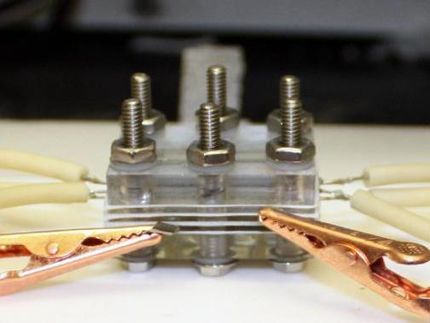Queen's University professor's chemistry discovery may revolutionize cooking oil production
Advertisement
A Queen's University chemistry professor has invented a special solvent that may make cooking oil production more environmentally friendly.
Philip Jessop, Canada Research Chair in Green Chemistry, has created a solvent that – when combined with carbon dioxide – extracts oil from soybeans. Industries currently make cooking oils using hexane, a cheap, flammable solvent that is a neurotoxin and creates smog. The process also involves distillation, which uses large amounts of energy.
"Carbon dioxide is famous for global warming – it's everybody's favourite gas to hate these days," says Professor Jessop, who specializes in green chemistry. "My research group is trying to figure out if we can use it for something useful. I figure we may not be able to recycle all the carbon dioxide out there but we can recycle a bit of it and make it contribute to society in a positive way."
Jessop's new method of making oil involves a "switchable" solvent. This solvent is hydrophobic, meaning it mixes with oils and doesn't like water. But when carbon dioxide is added, the solvent becomes hydrophilic, meaning it mixes with water and doesn't like to be in oil. So when carbonated water – carbon dioxide and water – is added to a mixture of the solvent and soybeans, the oil is extracted out of the soybeans and collected. When the carbon dioxide is removed, the solvent switches back to its hydrophobic state.
"The water and the solvent can be used again so everything is recycled. The end result is you have extracted soybean oil and there is no energy-consuming distillation required," says Professor Jessop, who who did research in the 1990s under the supervision of Nobel Chemistry Prize winner Ryoji Noyori.
While this process has only been done in labs, Professor Jessop says he has already heard from cooking oil companies and GreenCentre Canada who are interested in his research. But the solvent is still years away before it can ever be used in large-scale oil manufacturing.
Professor Jessop is trying to get rid of the use of volatile chemicals such as hexane by giving industries an option to use a manufacturing process that is both economically and environmentally friendly.
"The advantage of hexane is that it's cheap. When you do green chemistry, you have to worry about cost. You can't just say 'Look at this, industry, it's greener!' If it costs 10 times as much, no one is going to use it," Professor Jessop says. "So next we have to do the economic calculations to see how much it is going to cost. If manufacturing with this environmentally friendly solvent is really expensive compared to the hexane, we have to figure out how we can we make it cheaper."
Original publication: Green Chemistry



























































